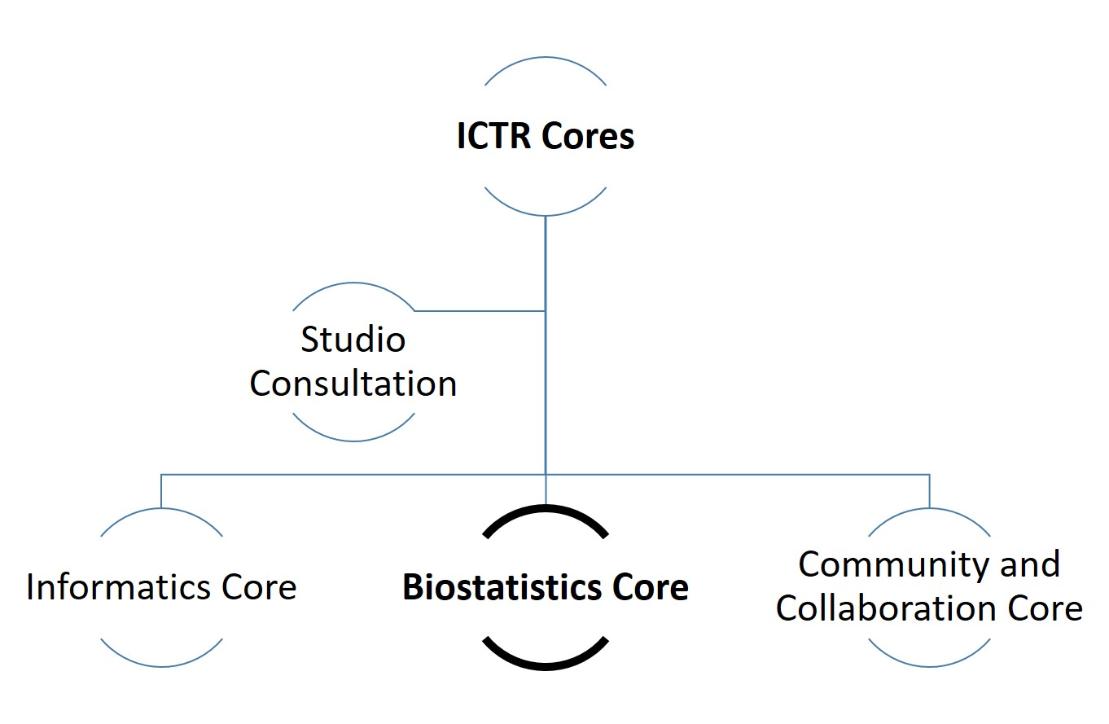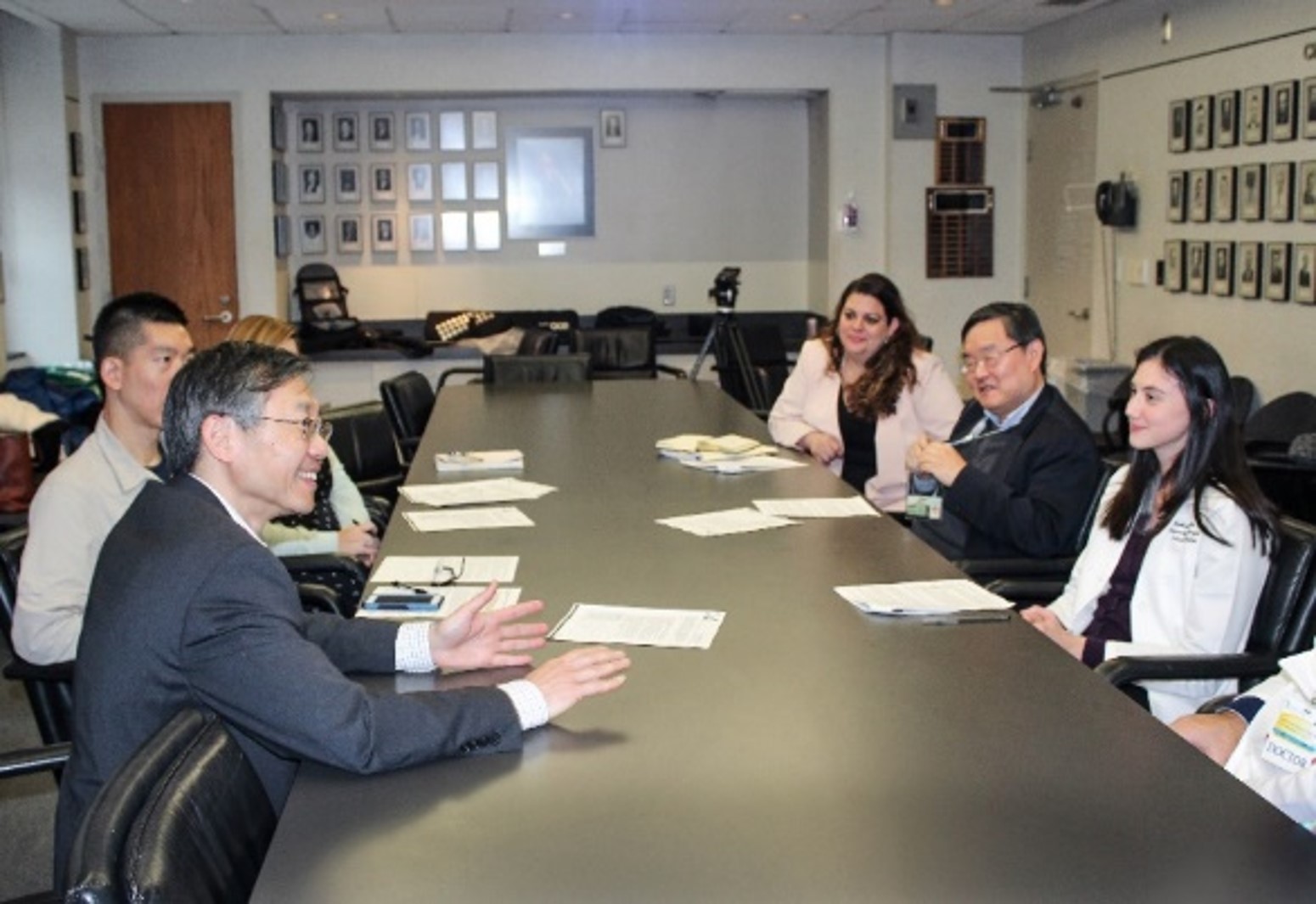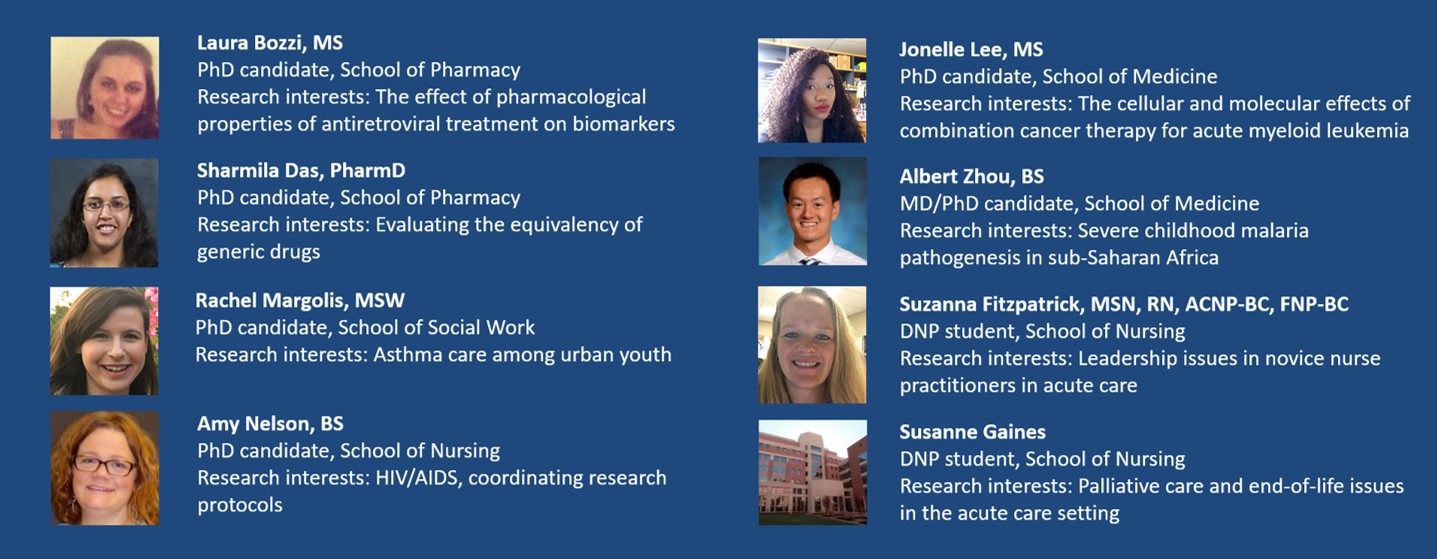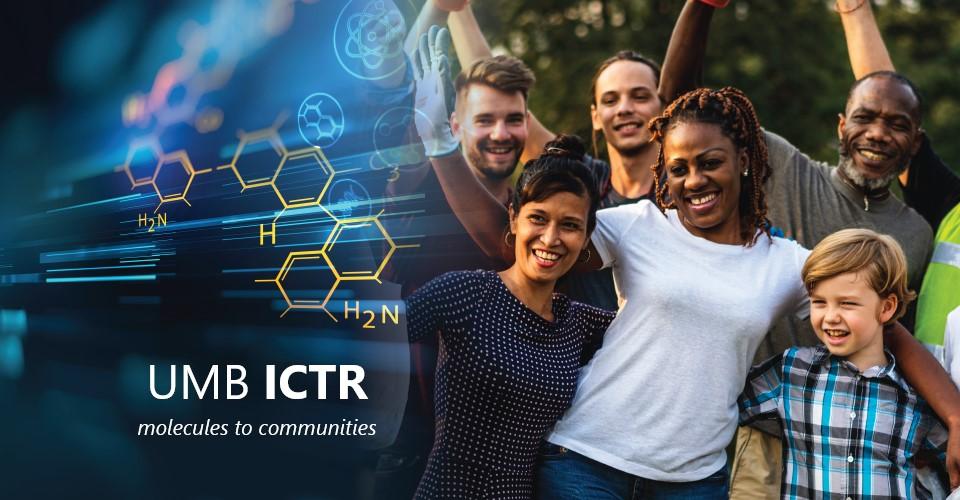Upcoming Events
April 1: ICTR Voucher Deadline
April 5: KL2 Application Deadline
May 15: ICTR Grand Rounds
Speaker: Dr. Alan Shuldiner, Director of the UMB Program in
Personalized and Genomic Medicine
Medical Center Auditorium (Shock Trauma)- T1R18
Noon-1 pm
ATIP at Work
Developing Novel Therapeutics for Pseudomonas Lung Infections
Last January ICTR launched the inaugural round of Accelerated Translational Incubator Pilot (ATIP) awards. We received a total of 25 applications covering a wide range of topics, including in vivo testing of novel drug therapies, the development of screening tools, and the implementation of novel interventions at the community level, among many others. We funded 12 milestone-driven projects based on their relevance to translation, broad impact, their scientific merit and feasibility, and the formation of interdisciplinary collaborations between investigators or academic-community partnerships. In this first issue of our newsletter we talk to one of our ATIP 2018 awardees, Erik Lillehoj, PhD. Dr. Lillehoj (Associate Professor, Pediatrics, School of Medicine) is working alongside Richard Dalby, PhD (Professor, Pharmaceutical Sciences, School of Pharmacy), developing a therapeutic intervention for lethal Psuedomona aeruginosa (Pa) lung infection, a condition that commonly occurs in mechanically-ventilated patients in intensive care units (ICUs).
The vast majority of the 100,000 Pa lung infection cases per year in the US are treated with antibiotics. However, their ability to eradicate Pa infections is limited by the emergence of multi-drug resistance bacteria. To address this clinical challenge, Dr. Lillehoj and Dr. Dalby are developing membrane-tethered mucin (MUC1) synthetic peptides that competitively block Pa from adhering and invading the respiratory epithelium. This approach provides several advantages over current antibiotic treatment plans. The peptides themselves have a decreased potential for the development of bacterial resistance and, given their mechanism of action, they can target both antibiotic-susceptible and multi-drug resistant Pa strains. Importantly, while antibiotics target bacteria that are actively growing, MUC1 synthetic peptides also target bacteria in a quiescent state. This makes them a potential adjunct to current antibiotic approaches to hopefully shorten the duration of antibiotic treatment and slow the development of resistance.
As part of this collaboration across UMB schools, Dr. Dalby is contributing his expertise in aerosol drug delivery to design and perform in vivo testing of MUC1 peptides in a mouse model of Pa lung infection. ICTR’s ATIP award has helped enable these costly translational experiments, which include dose tolerance and pharmacokinetic studies with MUC1 peptides with initial favorable clinical profiles.

We look forward to Dr. Lillehoj and Dr. Dalby’s results and how their translational work on mucosal immunity will contribute to the development of novel therapies for infectious diseases. Since the start of this ATIP project, Dr. Lillehoj received notice that a preclinical stage biopharmaceutical company, Gen1E, entered Into an exclusive option agreement with UMB to license patent rights related to his MUC1 peptide work. Gen1E is interested in developing a MUC1 peptide as a therapy for Pa infections in cystic fibrosis patients. Check our website often for updates on currently-funded projects and upcoming deadlines. We just received our second round of ATIP applications and will be announcing our second round of winners this Spring!
ICTR Free Services
ICTR Cores
ICTR collaborates with colleagues from all UMB schools to provide faculty researchers with expert project-specific support through ICTR Cores. ICTR has multiple cores that provide free services- for example, Biostatistics, Informatics, and Community Engagement, as well as Studio Consultations. The Biostatistics, Informatics, and Community and Collaboration cores each provide faculty researchers 25-50 hours of free services, depending on the project.

In this issue, we highlight the work of the Biostatistics Core. Since the launch of the ICTR one year ago, this is by far the most requested Core service. Headed by Soren Bentzen, PhD, DMsc, the Biostatistical Core is available to provide expert support from study concept and design including power calculations, to statistical analysis and preparation for publication. For example:
- Study Design and Power Analysis: Feasibility study and sample size based on the state of the art methodology, such as multistage and adaptive designs. In addition, we design and perform randomization, sensitivity and simulation studies to evaluate study design properties, and sample sizes needed to achieve study objectives, endpoints, and control selection.
- Obtaining Data from Outside Sources: We have experts on campus that can assist you with obtaining data from outside sources such as CMS, DHMH, and UMBC, as well as assistance with securing Memorandums of Understanding or Data Use Agreements.
- Statistical Analysis: We follow the data analysis plan provided in each protocol. Assumptions underlying the methods are assessed and the most appropriate statistical method is used for analysis. Beyond major statistical software packages such as SAS, Splus, Stata, StatXact and East, more complex statistical and bioinformatics tool are developed for specific research project (in R or Matlab or SAS). Discovery, pattern recognition, image analysis, and data mining.
- Interim Analyses and Data and Safety Monitoring for Clinical Trials: Analyses and adaptive designs (including Bayesian designs) consistent with statistical principles for multiple testing and interim analyses.
- Statistical bioinformatics: Analysis of "Big Data" including systems biology, gene regulatory network inference, module biomarker discovery, network biology, data integration, systems pharmacology, personalized medicine, disease-drug-gene association discovery, pattern recognition, image analysis, and data mining.
- Reports and Publications: Data analyses are summarized in a statistical report in a form appropriate for manuscripts.

To obtain access to free hours of support, visit https://www.umaryland.edu/ictr/investigator-resources/. Visit any of the Cores to access the ICTR Resource Request form link (you will need to use your UMID username/password to access form). We accept applications for ICTR Core Services daily.
What is a Studio?
Studios are integrated, dynamic, and interactive roundtable discussions that bring relevant research experts from diverse academic disciplines together in response to a faculty member’s request for assistance. Studios focus on a specific research project at a specific stage and provide feedback in areas such as hypothesis generation, study design, biostatistics, implementation, data analysis and interpretation, recruitment, and research ethics. The primary goal of this program is to assist researchers in developing, implementing, and conducting translational research.
Studios are led by one of the Program’s Co-Directors, Wilbur Chen, MD, MS (Associate Professor, Department of Medicine) and James Campbell, MD, MS (Professor, Department of Pediatrics) and typically run for 60-90 minutes. Each Studio includes a panel three to six UMB experts from multiple disciplines. One recent example is a Studio requested by Hening Ren, PhD (Assistant Professor, Division of Oncology, School of Dentistry) for feedback on the direction of an ongoing project. When asked about his Studio experience, Dr. Ren commented it “was a valuable platform that provided a connection with the clinicians working in lung treatment and fellow scientists that are experienced in translational research.” He went on to say “their input is important for the development of my own translational research project.”

Studio attendees from left to right: Dr. Wilbur Chen (moderator), Dr. Hening Ren, Ms. Meghan Banchero, Dr. Meriem Gaval-Cruz, Dr. Hegang Chen, Dr. Katherine Scilla, Dr. Christian Rolfo

How to apply for a Studio:
Visit the ICTR website, and complete the Core Service Request Form. Applications are accepted daily! Once the form is submitted, you will be contacted to set up the Studio session. For questions, please email: ICTR-Navigator@umaryland.edu. Click here to hear more about Studio Consultations.
Get to Know a Core
UMB’s Pharmaceutical Research Computing (PRC) Service Center
There are over 35 UMB cores of services that are eligible for ICTR Voucher support. With so many choices, it is likely you may not be aware of all the services available to you and your research team. To help you learn more about these resources, we would like to highlight one UMB core in each ICTR quarterly newsletter. In this first issue, we are proud to highlight one of UMB’s hidden gems: the Pharmaceutical Research Computing (PRC) Service Center.
Founded in 1841, the University of Maryland School of Pharmacy (SOP) is the fourth oldest school of pharmacy in the nation and one of the professional schools located at UMB, a thriving center for life sciences research and community service. The Pharmaceutical Research Computing (PRC) Service Center in the Department of Pharmaceutical Health Services Research (PHSR) has been providing a wide range of services to UMB campus researchers for 20 years.
Services include:
- Analytics (discovery, interpretation, and communication of meaningful patterns in data)
- SAS programming
- Data management, statistics, and epidemiology
- Obtain data from outside sources
- Secure Memorandums of Understanding or Data Use Agreements
- Assist investigators in securing IRB approval.
The PRC service center also maintains the Pharmaceutical Health Services Research (PHSR) Community Database Program that oversees several large data sets, such as:
- Medicare Chronic Conditions Warehouse (CCW) 5% sample
- Medicare Current Beneficiary Survey (MCBS) 5% sample
- IMS Health Pharmetrics Plus 10% sample.

These data sets are available to UMB faculty members for research and publications.
Eberechukwu Onukwugha, PhD, MS (right) is the Executive Director of the PRC and Associate Director of the UMB ICTR Biostatistics Core. For more information about PRC services contact 410-706-5315 or prc@rx.umaryland.edu.
Click here for a list of core services available across the UMB campus.
"Meet the Navigator" Series
Research Navigators’ primary goal is to be a link between investigators and the ICTR to increase efficiency and quality of translational research. Having broad experience on the preparation and implementation of clinical and translational studies, Research Navigators are research partners who help answer questions from investigators and research teams. Navigators provide guidance tailored to a specific project’s needs, such as how to best use ICTR Core Services, help finding collaborators or research equipment, regulatory help with institutional procedures and compliance, identification of resources, and assistance with IND/IDE submissions, among other things. Navigators can also help identify funding opportunities for specific projects, which is beneficial for young and seasoned investigators alike.
Currently, the UMB ICTR has six research navigators with a variety of expertise: Nicholas P. Ambulos, PhD; Yen-Pei “Christy” Chang, PhD; Meriem Gaval Cruz, PhD; Jung-Soo “John” Hong, MD; Graziela Z. Kalil, PharmD; Jennifer Marron, BSN, RN. In each issue of our newsletter, we will highlight one of the ICTR navigators.
In this first issue, we are highlighting the work of Nicholas P. Ambulos, PhD. Dr. Ambulos received a PhD in Biology/Molecular Biology from the University of Maryland Baltimore County. He joined UMB as faculty at the School of Medicine (UMSOM) in 1992 and began his tenure in the Biopolymer Core Facility, becoming its director in 1993. Since 2004, Dr. Ambulos has been the Associate Director for shared services at the Marlene and Stewart Greenebaum Cancer Center. In 2011 he played a key role in establishing the Translational Genomics Laboratory, a genomics lab accredited by the College of American Pathologists.
Dr. Ambulos is the founding director for the UMSOM Center for Innovative Biomedical Resources (CIBR) and is responsible for facilitating interactions between core laboratories, investigators and UMSOM leadership. CIBR provides the infrastructure that supports all of the UMSOM core facilities and the NIH Shared Instrumentation grants, such as a $1.6 million grant for an automated Biobank freezer with integrated robotics that is the foundation of the University of Maryland Medicine Biorepository.
When asked about his role in the ICTR, Dr. Ambulos says “Being a Research Navigator is, in large part, what I’ve done for many years.” Over the years, Dr. Ambulos says he has “gained considerable insight into core labs and how they can best function to support the dynamic research here in the UMSOM.” He adds, “I’ve become very familiar with most of the core labs, their capabilities, staff, and equipment… It’s easy for me to help guide investigators towards the best solution and best core laboratory to answer their research questions.”

For Dr. Ambulos, the best part of being a Research Navigator is being able to work with many different investigators with diverse research needs. “When I chose to run a core lab as a full-time commitment, it meant that I would no longer be pursuing my own research interests. Looking back, I’ve never missed out on anything. Each investigator that I work with, I treat their research as if it were my own! It’s actually quite rewarding, and something I look forward to every day. Being a Research Navigator is not much different. I get to learn what questions investigators are asking, and if I can help them I will, or I’ll identify the best person who can,” said Dr. Ambulos.
As an ICTR Research Navigator, Dr. Ambulos has answered many different questions. “Most of the questions are focused on where an investigator would go to find a core that can run a specific assay, or has a specific piece of equipment,” he said. “With over 20 core resource laboratories, it can be difficult to find what you need, having someone who can help point you in the right direction eliminates hurdles and frustrations. It’s all about simplifying research and access to research tools!”
ICTR Scholars
ICTR has selected eight UMB pre-doctoral scholars to participate, along with ICTR scholars from JHU, in the Pre-doctoral Clinical Research Training Program (PCRTP). The PCRTP is year-long career development opportunity that provides joint UMB and JHU programming to expose and train scholars in clinical research. The Program allows Scholars to become part of specialized research teams at UMB and JHU and train in patient-oriented research. ICTR Scholars participate in monthly PCRTP professional development activities and meet with ICTR Biostatistics advisors to learn the use of biostatistics in the design, implementation and interpretation of clinical and translational research. Scholars also receive $2,500 in ICTR voucher support to access any of the Core services on UMB’s campus.
















